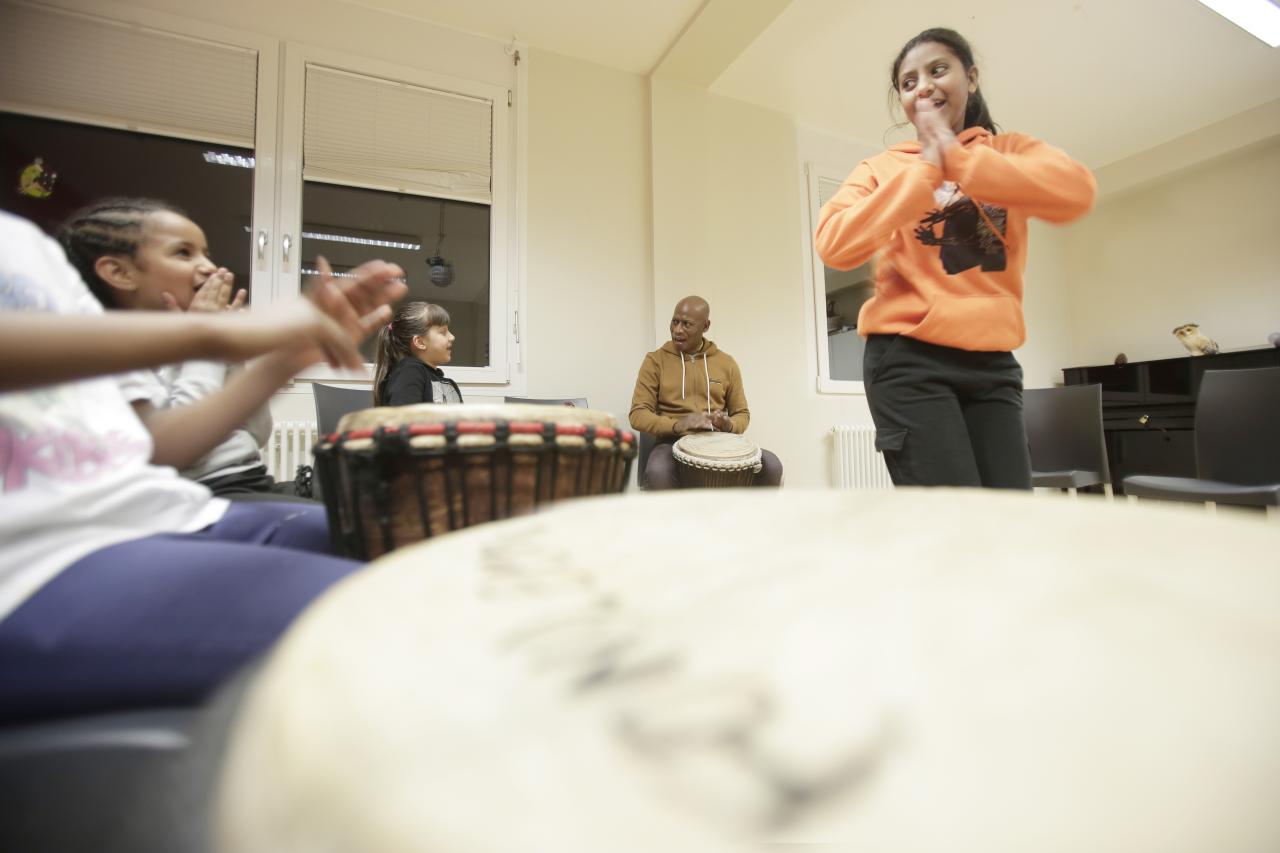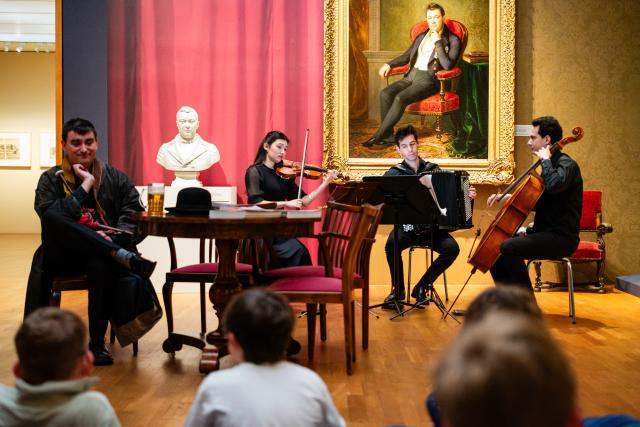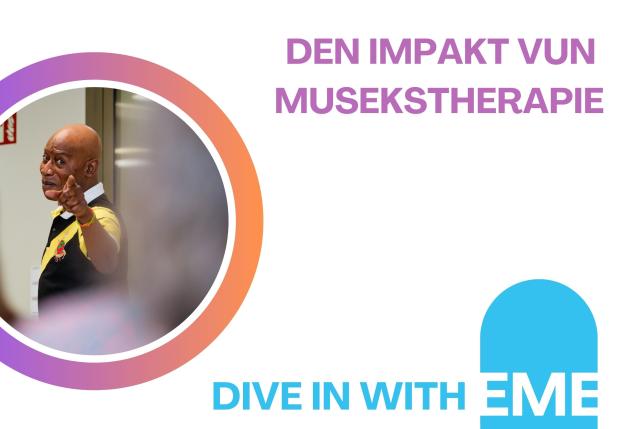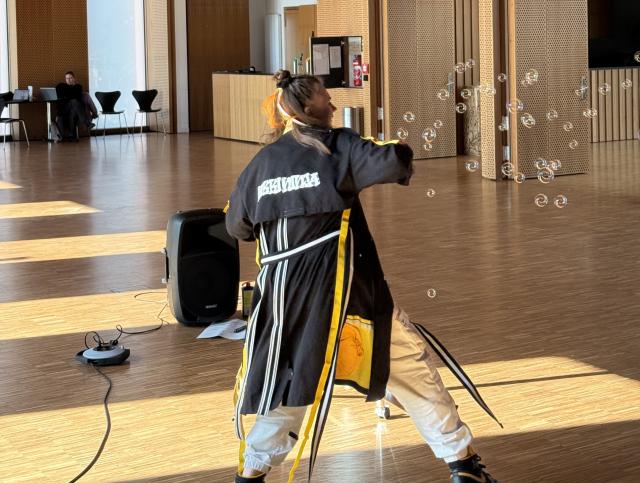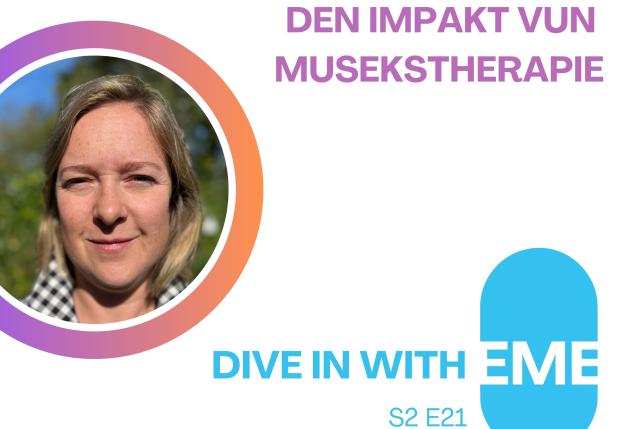Robert Bodja, music to keep the links alive
Published on 25 Jul. 23
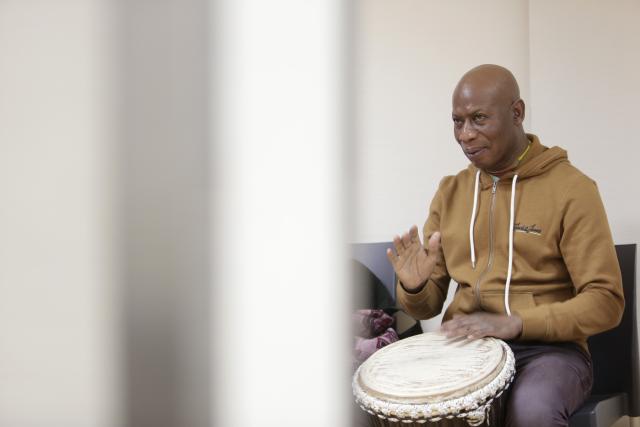
Political tensions in Togo
Togo is a West African country surrounded by Burkina Faso, Benin and Ghana. In 1990, Robert Bodja, then a young journalist who had just finished his studies, was committed to a multiparty system in Togo, a country ruled by the "Rassemblement du peuple togolais", a single state party. The issue of multipartyism divided the country and gave rise to very lively tensions.
Beginning to fear for his life, and sensing a wind of repression, Robert Bodja decided to flee to Benin in 1991. He then moved to Luxembourg, a safer country in his situation. Unfortunately, the young man had to leave his pregnant wife in his country: he would not be able to see his daughter until much later. He is on his way to Luxembourg…
Integration in Luxembourg
As soon as he arrived in the Grand Duchy, the administrative difficulties began. He’s applying for asylum, which will take six years to complete. Without this precious pass, he can neither work nor study…
He had always worked and could not bear to do nothing. He thus joined the local football team, as well as ASTI, the Association for the Support of Immigrant Workers. He is also an activist against torture. Gradually, and thought his various commitments, he became integrated into the Luxembourg community.
Indeed, in order to understand the tactical instructions during his football training sessions, he had to understand Luxembourgish! So he started to learn Luxembourgish, German and then English.
By doing voluntary work, he built the links that would enable him to find a job when his asylum application was finally accepted in 1997…
He was finally able to build his life in Luxembourg when his wife and daughter were allowed to come to Luxembourg in 1998. After all this time, he met his daughter, who was already six years old! His family then grew in Luxembourg, with two more children.
Music as a refuge
How can one keep hope when he has to wait six years for refugee status?
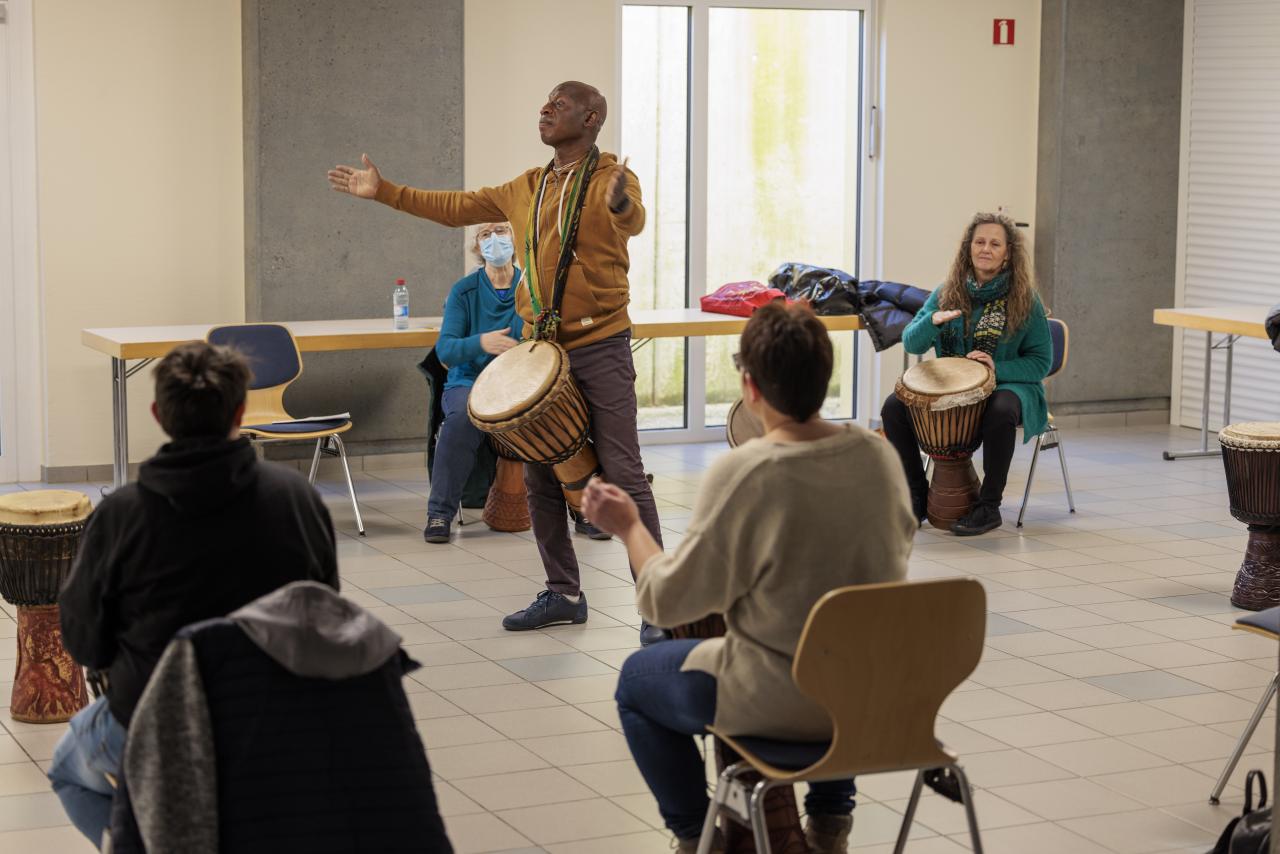
Music has always been part of Robert Bodja's life; since early childhood, his teachers noticed his voice. When he was ten years old, he started a music and theatre group with his friends for the people in his neighbourhood. He went from street to street to promote his shows!
As an adult, he continued to play the drums. Having finished his studies in journalism, he did daily reports on musical subjects as soon as possible: music was never far from him and he tried to reconcile his musical passion with his work.
So when he arrived in Luxembourg and found himself in an unpleasant situation, music became his refuge. When his family was still far from him, music allowed him to forget his worries and not to lose hope, despite the political and administrative difficulties.
Indeed, Robert BODJA set up his own music group "Les ZIMIT" in 1995, now known as "Black Dejmbé". Luxembourg being the European capital of culture that year, the opportunity was ideal. At the time, they were the only African folk music group. The musical activity provided him with an occupation, but also allowed him to give pleasure to others. The group was a great success; gradually the group had more and more performances.
In this music group, Robert plays the Djembe. This was a first for him, who did not play the djembe when he was still living in Africa, preferring the drums. However, in this complicated context in which he was far from his loved ones, the rhythms that rocked his childhood came back to him instinctively. "I felt nostalgia for my culture, " he says. "This is what allowed me to reconnect with my culture. Everything came back to me, the melodies of my childhood. It was magical. I fought to bring my culture from my country; I wanted to keep and share my culture." As he says himself, this is what allowed him to never feel out of place.
Professionally too, he stayed committed to his country of origin. For nearly 14 years, he worked with ASTM, Action Solidarité Tiers-Monde. This work made him reflect on North-South interdependence and gave him a lever for positive action in his home country. This field work obliged him to travel constantly, within Luxembourg but also around the world.
Since then, he has trained as an educator and specialised in Djembe and Gospel workshops, and regularly accompanies groups of elderly people. He works most of the time with the group Servior and is also a musician for the Fondation EME.
Musician at the Fondation EME
Robert's goals include making music accessible and working on musical and cultural inclusion. Therefore, it makes perfect sense that he collaborates with our Foundation.
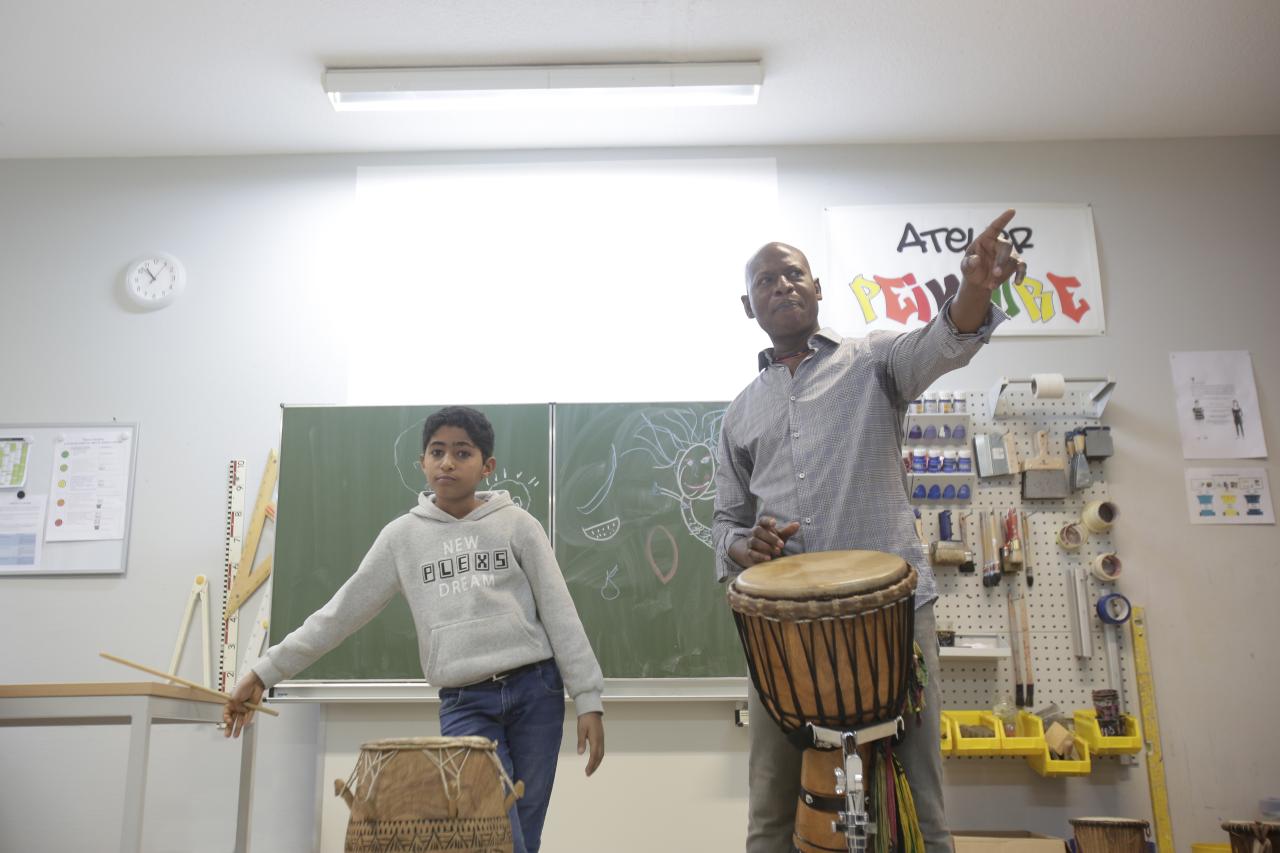
The Fondation EME has been in existence since 2009, and Robert Bodja was one of the first to collaborate with the Foundation in the Wassa Wassa project. This project offered the opportunity to discover new instruments, produced for the occasion. When Robert tells us about the show that took place at the end of the project, he says he was amazed by the result. This project benefited young people from all over Luxembourg: young people in difficulty, in homes or with disabilities. The project started in 2009 with the desire to bring together young people from different backgrounds, to show them that they are not alone.
The Fondation EME, for which he runs many workshops, is very proud to collaborate with such an artist… The latest project? Akwaba Menike, at the Luxembourg Red Cross refugee centre in Dudelange, where he teaches young refugees to play the djembe. These are all opportunities to share his vitality and his music, in which the artist shows undeniable educational virtues.
Today, Robert Bodja works with both children and the elderly. This dual role was put to good use in a multigenerational project in June 2022 with the Djammo Djammo project, during the Fräiräim Festival…
Musician with the Seniors
The audience he enjoys working with the most? Seniors! His favourite projects? Precisely, intergenerational projects and those that allow to mix environments! He speaks with emotion about the major Gospel projects he had the opportunity to create. Gospel and Friends, Gospel O'Pluriel… So many opportunities to mix groups and generations.
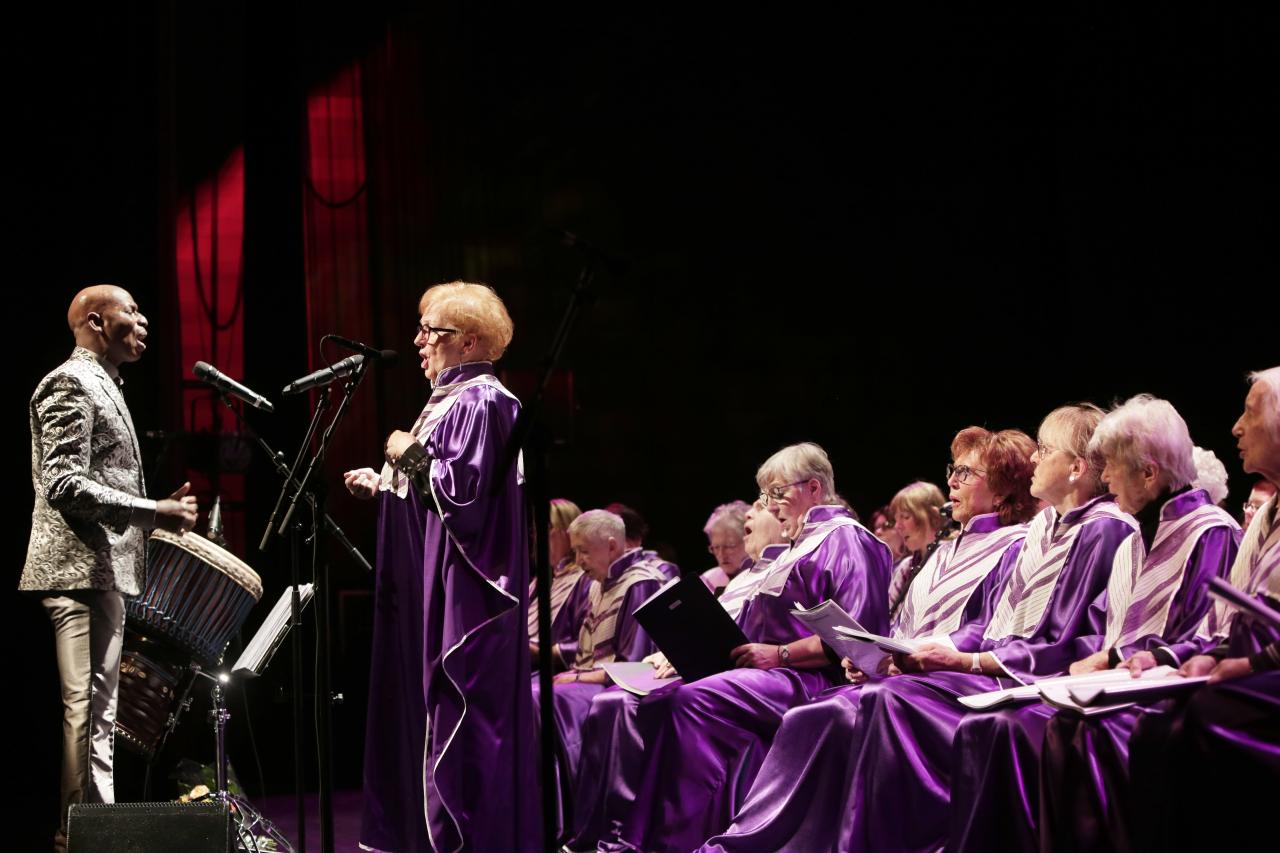
During the workshops he runs, the people he accompanies have the opportunity to forget the worries of their daily life through music – just as it played a saving role for Robert Bodja during his most difficult years.
He makes those he accompanies discover new instruments. Robert Bodja plays djembé, but also balafon, a wooden instrument struck by chopsticks, which resembles a xylophone. The workshops ryhthm their days by bringing them a new goal, music – something essential to stimulate them every day. For his Gospel projects, he also gives English classes to the elderly…
One can’t help but see how music is used, by Robert Bodja, to forge links between others and himself, but also within the groups he accompanies. Just watch the photos of the bands he supervises! One can see the joy that illuminates the faces, in those moments that seem out of time.
To conclude
Despite the many challenges, Robert Bodja has never been afraid to continue to be open to others. He learnt to speak other languages, got involved in various associations…
But it was music that was the best way to integrate into Luxembourg life, to meet people and share his culture. For people who knew neither the djembe, nor gospel, nor English…, it gave them access to a different music, as well as to new cultural references.
It is precisely when communication is most complicated and one is tempted to turn to its own inner world that music plays its greatest role.
